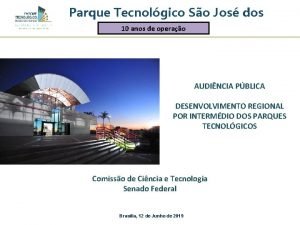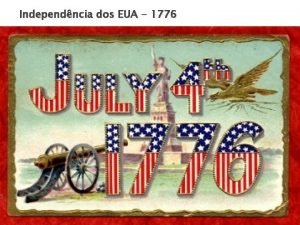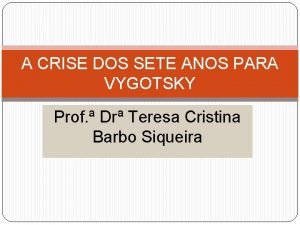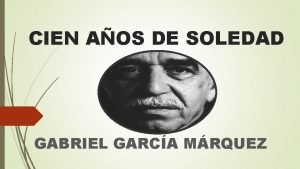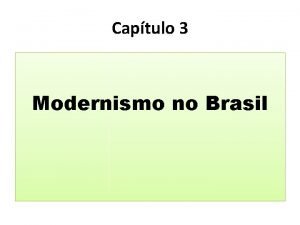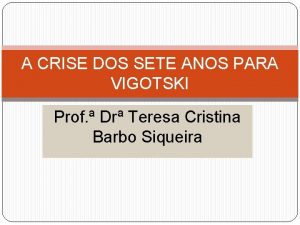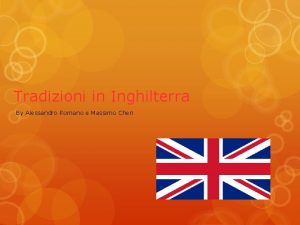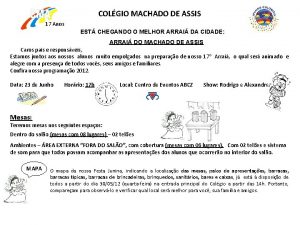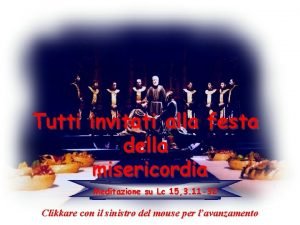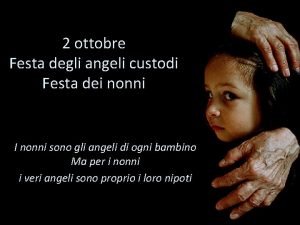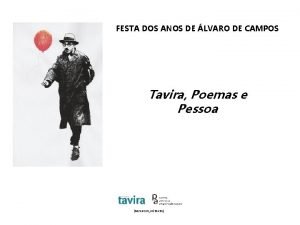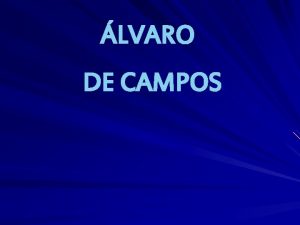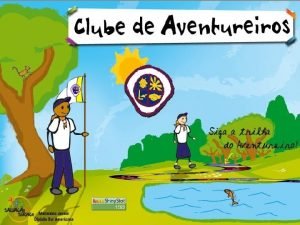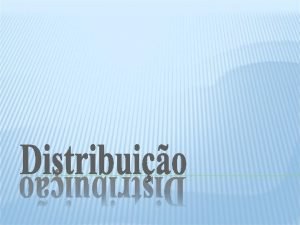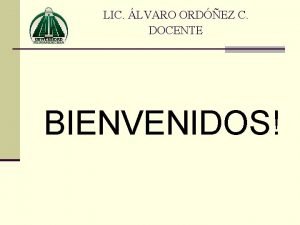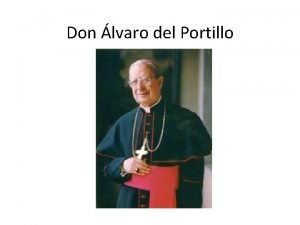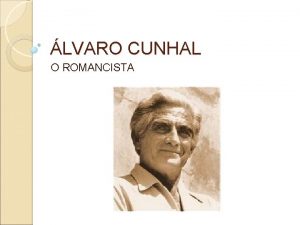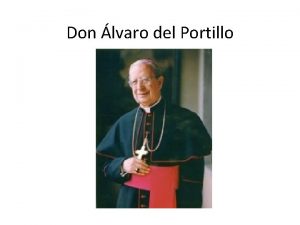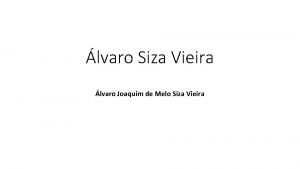FESTA DOS ANOS DE LVARO DE CAMPOS 2017












- Slides: 12

FESTA DOS ANOS DE ÁLVARO DE CAMPOS 2017 Birthday Party for Álvaro de Campos 2017 Tavira, Poemas e Pessoa Tavira, Poems and Pessoa

Being an engineer, Álvaro de Campos extolled progress, speed, the power of the machine, industrial civilisation. In the year of his birth, 1890, progress in Tavira was signalled by the opening of a stretch of road from Santo Estevão to the bandstand that was destined to be the focus of the public gardens, inaugurated in the same year as a place of leisure for Tavira's citizens. . To illustrate some of Álvaro de Campos' poems, presented here are some images from the Tavira Municipal Archive photography collection. As he had family connections in Tavira, also presented are some curiosities, documents related to Fernando Pessoa's family.

"When they celebrated my birthday, I had the tremendous healthiness of understanding absolutely nothing, Of being clever for within the family, And of not having the hopes that the others had for me. " Aniversário Last will and testament of Jacques Pessoa, 1908 Register of the burial of João Daniel Gil Pessoa, 1902 Fernando Pessoa's family connections with Tavira are already known and, through documents in the Tavira Municipal Archive, we record these family ties here. Jacques Pessoa, son of Jacques Cesário Pessoa and Maria de Luz Lampreia, was born in Mértola in 1849. Second cousin of Fernando Pessoa, he died in Tavira on 2 nd January 1909. On 7 th November 1910, The Tavira Municipality decided, in homage to this republican activist, to name after him the riverside street that runs from the mediaeval bridge to the Largo da Caracolinha. His will refers to him as a bachelor but with four adopted children, all minors. He named "his particular friend Luís Augusto Camacho Sabbo" to take care of his children Alzira, Jacques and Eduarda, He declared he had a safe box with 45 shares Royal Railway Company, which he left to Francisca da Conceição Caçapo, spinster, "who lives in his company".

Genealogy of Fernando Pessoa and its connection to Tavira Daniel Pessoa e Cunha b. Serpa 05/08/1780 e d. 31/10/1822 Joana Xavier Pereira de Araújo e Sousa b. Faro, 13/03/1788 José António Pereira de Araújo Pessoa d. Tavira 23/02/1828 Joana Xavier Gil Pessoa Married in 1864 with Manuel F. Aboim �Head of the Misericórdia (a charitable institution) in Tavira in 1891 João Paulo de Araújo Pessoa� b. Tavira 13/03/1811 and d. 1888 Maria José da Natividade Gil Cardeira Joaquim António de Araújo Pessoa b. Tavira 15/02/1813 Dionísia Rosa Estrela de Seabra d. Lisboa Jacques Cesário de Araújo Pessoa� b. Tavira 26/02/1816 Maria da Cruz Lampreia João Daniel Gil Pessoa d. Tavira in 1902 Maria Teresa Ribeiro Ramos (1 st marriage) Júlia de Chelmicki (2 nd marriage, 1880) - without progeny Joaquim de Seabra Pessoa b. Lisboa a 28/05/1850 Maria Madalena Pinheiro Nogueira d. Angra do Heroísmo Jacques Pessoa b. Mértola 1849 d. Tavira 02/01/1909 Ester Ramos Pessoa João José Pádua Cruz (1905) (3 daughters and 1 son) Fernando António Nogueira Pessoa, b. Lisboa 13/06/1888 �Chief custodian of health. Notary. Alderman and President of Tavira Municipal Council in 1840. �Manufacturer, Fábrica de Moagem e Massas de Tavira (milling and paste factory), established in 1890. �Doctor and Alderman of the Tavira Municipal Authority in 1880; Council Administrator 1877.

The progress of Álvaro de Campos and Tavira "But, ah again the constant mechanical rage! Again the obsession of omnibuses stirred into movement. And again the frenzy of travelling at the same time inside all the trains Of all the parts of the world, Of saying goodbye aboard all the ships, Which at this moment are heaving iron or are moving away from the docks. The iron, the steel, the aluminium, the corrugated iron sheets! The quays, the ports, the trains, the cranes, the tugboats!" Ode Triunfal Official letter, dated 11 th January 1890, from the Fundação do Ouro, at Porto, advising that the bandstand followed by steamer as far as Olhão.

"There are processions, trappings, debates, At the daily inauguration of my useless sentiments. . . Lit at the Venetian blind by a cheerful light Are my deceptions, and my despairs spin like a carousel By a (fated) necessity of destiny. " Há cortejos, pompas, discursos 1888 plan of the bandstand. Its arrival and inauguration in Tavira are given as 1890, the date of birth of Álvaro de Campos. The plan for the bandstand, designer unknown, was ordered from Fundição do Ouro in 1888. It was delivered in 1890 as can be read in the letter dated January 11 th 1890, informing the Câmara Municipal that the bandstand had been shipped to Olhão. It was located in the centre of the garden. Its plan is octagonal and it is representative of 19 th century cast-iron architecture. This work of art which still today enhances the beauty of the Tavira Public Gardens, represents here a symbol of the progress and industrialisation that Álvaro de Campos refers to in poems such as "Ode Triunfal" or "Tão pouco heráldia a vida!" ("So little heraldry in life").

"In the squares – perhaps the same as ours – What elixirs will be touted and proclaimed? With different labels, the same as those of the Egypt of the Pharaohs, With other ways of making them buy, those that are already ours. " Nas praças vindouras — talvez as mesmas que as nossas — It was in the Tavira Public Gardens, inaugurated in 1890, that the bandstand was installed, as can be verified in this undated plan. The gardens were also known as The Bandstand Gardens. Their layout was altered in the 20 th century so that, instead of the beaten earth surface, we today have a paving of typical Portuguese calçada (surface of cobblestones). The Bandstand Gardens today are a place for meeting, for social activity and for leisure, as was intended when they were laid out.

Fernando Pessoa. The factory was sold in 1920 to Joaquim António Pacheco, becoming the J. A. Pacheco bakery, which closed in 1971. "The dolorous light from the huge electric light bulbs of the factory I have a fever and I write, grinding my teeth, wild for the beauty of it, For a beauty of it totally unknown to the ancients. The wheels, the gears, eternal r-r-r-r. The powerful retained spasm of machinery in a fury! In a fury outside and within me, For all my dissected nerves outside, For all the papillae outside everything with which I feel! My lips are dry, O loud modern noises, From listening to you much too closely, And my head burns with your wanting to sing With excessive expression in all of my sensations, With contemporary excess of you, O machines! Ode Triunfal

"Ah, to be able to express myself like a machine expresses itself. To be complete like a machine. " Ode triunfal Design for an irrigation cart, which the Municipality came to acquire, according to an official document of 17 th July 1890.

Map showing the construction of municipal roads. Correspondence received from the Tavira Municipality, 1890. “Partamos para onde se fique. Ó estrada para não-haver-estradas! Término no Não-Parar!” Walt Whitman The opening of roads was always a sign of progress, allowing improvements to and an increase in means of communication, bringing people, places and goods closer together. In 1890 there many demands for the construction of roads, as the map showimg the construction of municipal roads indicates. However, in 1890, it is known that only the road from Santo Estevão to the centre of Tavira was constructed within the bounds of Tavira and Olhão. This document reflect the urgency in opening new ways for communication, especially rural roads which bring the forgotten "Campos" (countryside) to the increasingly modernising town.

Álvaro de Campos and Tavira "I finally arrived in the town where I spent my childhood. I got down from the train, I remembered, I looked, I saw, I compared. (All of this took the length of time of a tired gaze). Everything is old where I was young. (. . . ) Suddenly I proceed secure, resolutely. All my hesitation has gone This town of my childhood is, in the end, a foreign city. " Col. CMT, origin unknown Col CMT, the Andrade family Notas sobre Tavira Col. CMT, origin unknown Col. CMT, Solésio Padinha.

Archive Sources: Fundo da Câmara Municipal de Tavira Coreto de Tavira, 1888 Planta do Jardim Público, s. d. Livro de Atas da Vereação, nº 22, 1890, fl. 80. Livro de registo de enterramentos, 1892 -1902, fls. 82 v. e 83 Correspondência recebida, 1890 Coleção fotográfica Fundo da Administração do Concelho de Tavira Livro de registo de testamentos da Administração do Concelho de Tavira, nº 62, fls. 46 vº a 50 vº Bibliography: Poemas de Álvaro de Campos: http: //arquivopessoa. net/textos/580 [acesso em linha, setembro 2016] Casa Fernando Pessoa, Cronologia: http: //casafernandopessoa. cm-lisboa. pt/ [acesso em linha, setembro 2016] ANICA, Arnaldo – “Toponímia de Tavira”, Câmara Municipal de Tavira, 2000. CHAGAS, Ofir –”Tavira - Memória de uma cidade”, edição do autor, 2004. Texts and selection of material and documents: Arquivo Municipal de Tavira Translation: John Coston
 Parque tecnologico sao jose dos campos
Parque tecnologico sao jose dos campos Guerra dos setes anos
Guerra dos setes anos Crise dos 7 anos infantil
Crise dos 7 anos infantil Llovió cuatro años once meses y dos días
Llovió cuatro años once meses y dos días Os modernistas dos anos 1920 frequentemente
Os modernistas dos anos 1920 frequentemente A tomada de bastilha
A tomada de bastilha Crise dos 7 anos
Crise dos 7 anos Il natale spesso è una festa rumorosa
Il natale spesso è una festa rumorosa Festa nazionale inghilterra
Festa nazionale inghilterra Interea niveum mira feliciter arte
Interea niveum mira feliciter arte Rainha da pipoca festa junina
Rainha da pipoca festa junina Invitati alla festa di dio
Invitati alla festa di dio Desta dei nonni
Desta dei nonni
